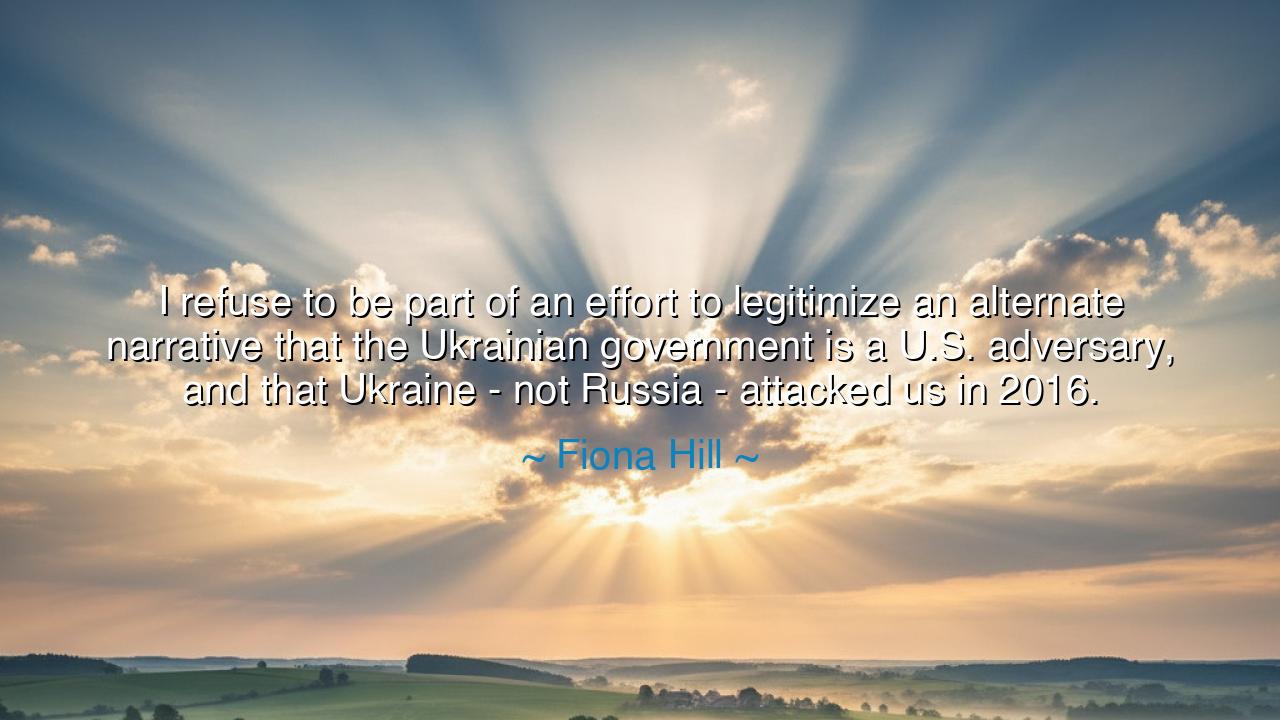
I refuse to be part of an effort to legitimize an alternate
I refuse to be part of an effort to legitimize an alternate narrative that the Ukrainian government is a U.S. adversary, and that Ukraine - not Russia - attacked us in 2016.






The words of Fiona Hill, spoken before the U.S. Congress in 2019, resound with the strength of conscience and the purity of truth: “I refuse to be part of an effort to legitimize an alternate narrative that the Ukrainian government is a U.S. adversary, and that Ukraine — not Russia — attacked us in 2016.” These words, calm yet thunderous in their moral clarity, belong to a time of great confusion—an era when truth itself was under siege, and the machinery of deceit sought to rewrite reality for the sake of power. Hill’s statement is not merely political; it is a stand upon the sacred ground of integrity, a defense of fact against falsehood, and of principle against convenience.
At its core, this quote is a declaration of intellectual and moral courage. Hill, a scholar of Russia and a national security official, stood amid storms of propaganda, division, and partisan fury. She refused to yield to the comforting lie that reality could be bent to serve political ends. Her words cut to the heart of a disease that afflicts all nations—the temptation to reshape truth when it becomes inconvenient. To “legitimize an alternate narrative,” as she said, is to abandon reason, to trade the light of understanding for the shadows of deception. In her refusal, she upheld a timeless principle: that truth, even when costly, must never be sold to the highest bidder.
The origin of this statement lies in one of the most turbulent moments in modern American history: the impeachment inquiry into President Donald Trump. Fiona Hill, then a senior expert on Russian affairs, was called to testify regarding allegations of political interference and the manipulation of foreign policy. In her testimony, she confronted a growing falsehood—that Ukraine, not Russia, had interfered in the 2016 U.S. election. This claim, she warned, was not only false but dangerous—crafted to distract, to divide, and to deflect blame from those truly responsible. By rejecting it, Hill did more than defend a nation; she defended the sanctity of truth itself against the relentless corrosion of propaganda.
Her words find kinship in the actions of countless truth-tellers throughout history. One might recall Galileo Galilei, who, when forced by the Church to renounce his discovery that the Earth revolved around the Sun, whispered, “And yet it moves.” Like Hill, Galileo stood alone against the powerful tides of denial. Both understood that to compromise truth for safety is to betray the very essence of civilization. Lies may offer temporary comfort, but they sow long-term ruin. The ancients knew this well; they warned that empires fall not from invasion, but from rot within—when truth becomes negotiable, and reality bends to the will of the ruler rather than the wisdom of reason.
The deeper meaning of Hill’s declaration reaches beyond politics and into the heart of moral responsibility. Every generation faces its own battle between truth and falsehood, and every citizen must choose a side. To refuse to “legitimize an alternate narrative” is not merely an act of defiance—it is an act of preservation. It is to guard the fragile thread of reality that binds society together. For when lies are repeated long enough, they become architecture—foundations upon which corruption and tyranny are built. Hill’s courage reminds us that truth is not self-sustaining; it must be defended by those who dare to speak even when their voices tremble.
Her statement also carries a warning about foreign manipulation and internal blindness. By falsely accusing Ukraine, a struggling democracy, of crimes committed by Russia, the narrative sought to weaken the unity of free nations and strengthen the hand of those who thrive on confusion. Hill, whose life had been devoted to studying the tactics of authoritarian regimes, recognized this trap. She knew that propaganda’s greatest weapon is not force, but persuasion—the slow erosion of shared reality until citizens no longer agree on what is true. To resist that erosion requires not just intelligence, but moral will, the kind that chooses fidelity to truth over allegiance to tribe.
The lesson of this quote, therefore, is as ancient as it is urgent: Truth is the first casualty when fear and ambition rule the heart. Every person, whether statesman or citizen, must decide whether they will stand with truth or bend before expedience. The path of integrity is often lonely and dangerous, yet it is the only path that leads to lasting peace. Fiona Hill’s stand reminds us that courage is not always measured in battlefields—it is often found in testimony, in the quiet refusal to repeat a lie, in the steadfast gaze of one who refuses to betray her conscience.
So, let her words echo as a torch for all who live in times of deception: never legitimize falsehood, even when truth is costly. For the lie may offer comfort, but it corrodes the soul. Truth may wound in the moment, but it heals across generations. Let every citizen, every leader, every seeker of justice remember that civilization itself rests upon this sacred covenant—that reality must never be rewritten to flatter power. And when the world tempts you to silence, remember the example of Fiona Hill: to stand firm, to speak clearly, and to guard the flame of truth until dawn returns.






AAdministratorAdministrator
Welcome, honored guests. Please leave a comment, we will respond soon